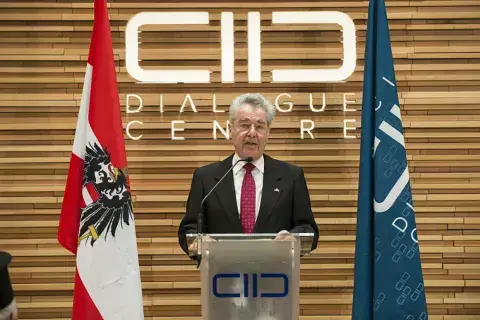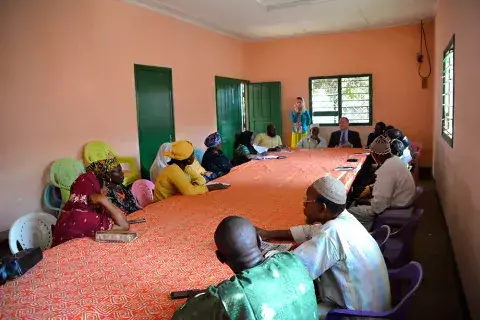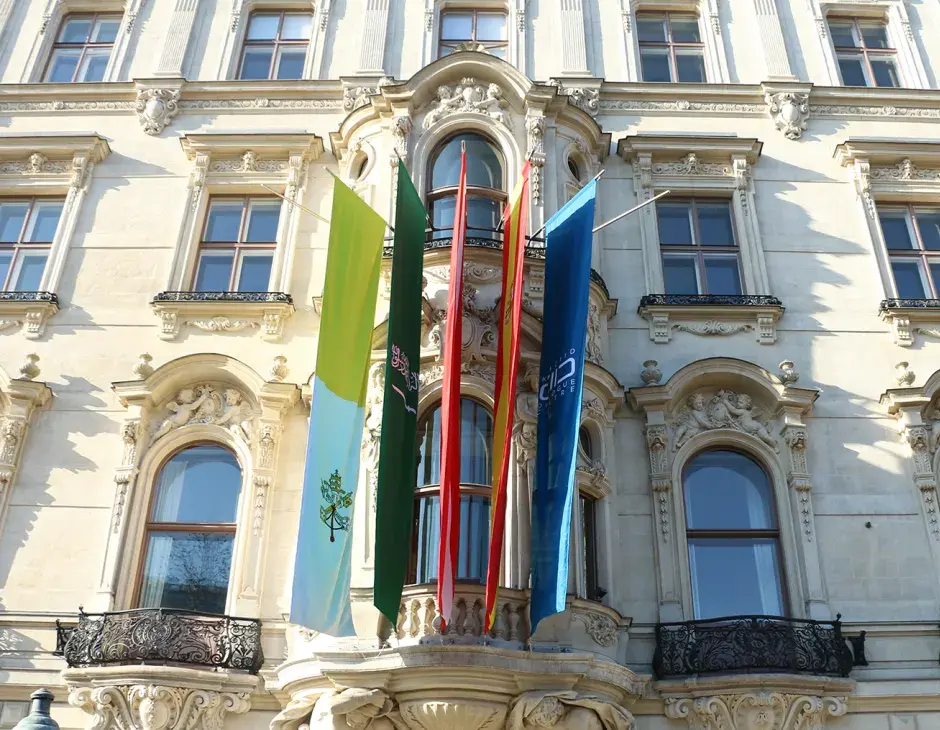KAICIID had a successful year in promoting peace and serving as a hub for dialogue all over the world. Below are some of our proudest achievements for 2016.
Dialogue Milestones

President Fischer & Dialogue at KAICIID
In 2016, KAICIID was honoured to host Austrian Federal President, Dr. Heinz Fischer, whose keynote at KAICIID headquarters described the importance of dialogue in ensuring peaceful coexistence and commended KAICIID for its work.
Advisory Forum Launches
We hosted the first meeting of the Board of Directors’ Advisory Forum, a consultative body from different world religions, religious organizations, and cultural institutions to address major issues of concern. The Forum’s members immediately held its first public dialogue on supporting the rights of others in the format of an interactive breakfast that gathered interreligious dialogue practitioners from around the world, as well as diplomats and stakeholders from intergovernmental organizations, policy-makers, civil society and the media to dialogue.
CAR Intra-Muslim Dialogue Launches
KAICIID convened a meeting of religious leaders over 40 religious leaders, representatives from Muslim women and youth communities and civil society who unanimously agreed to work together on a range of common issues and formed the action plan, forming the basis of our country programme. The dialogue was actively supported by a number of international figures, including noted scholar Sheikh Bin Bayyah, U.S Ambassador-at-Large for International Religious Freedom David Saperstein, Ufuk Gokcen, OIC Ambassador and Permanent Representative to the United Nations, New York. To express support from CAR’s Christian communities and the government, the Archbishop of Bangui, Dieudonne Nzapalainga, Reverend Nicolas Guerekoyame-Gbangou, and the Minister of National Reconciliation and Political Dialogue H.E. Lydie Florence N’Douba actively participated as observers.
Jubilee of Mercy’s Interreligious Symposium
More than 60 religious leaders and exemplars of mercy gathered for an international symposium organized by the Pontifical Council for Interreligious dialogue and KAICIID in Rome that was motivated by the conviction that through appreciating the shared value of mercy among all religions, interreligious understanding will be advanced. By engaging in dialogue, participants found a common value in mercy among all religions, which must be a part of our everyday lives.
In the Field

In 2016, KAICIID established permanent presence in our focus countries Nigeria, the Central African Republic, Iraq/Syria and in Myanmar/Burma, where full-time field experts are initiating and supporting interreligious dialogue platforms. In Nigeria, we hosted the first intra-religious dialogue, Coordinate to Achieve, bringing together Christians and Muslims from across the country. Interreligious workshops are being prepared for 2017 in the Central African Republic, as well as conducting fact-finding missions to further dialogue platform development. In Myanmar, Buddhist-Muslim dialogue workshops are on-going.
Fellows Programme
Entreing its third year, the 2016 KAICIID Fellows graduates and alumni welcomed the new 2017 Fellows and presented a year’s work in 40 local community initiatives in over 20 countries to reach out to youth, women and other religious communities to promote peace through dialogue. Projects boosted women into leadership roles as dialogue facilitators in Nigeria, promoted understanding between Confucians and Muslims in Indonesia, introduced students to different religious and indigenous communities in Northern Argentina, and even built a mobile phone adventure game requiring dialogue skills to overcome complex and engaging challenges.
Social Media
Continuing for its second year, the social media trainings engaged over 300 young, influential social media practitioners in Amman, Cairo and Erbil to intensively train them in using social media as a platform for interreligious dialogue.
Cooperation with UN
![UNDP MoU Signing [file:field-file-image-alt-text]](/sites/default/files/styles/large/public/undp_mou_signing_2_3.jpg.webp?itok=LXhJz75a)
UNDP MoU
In our joint commitment with UNDP to promote intercommunal peace in communities hosting large numbers of refugees, and to address vulnerabilities resulting from conflict and crisis in the Arab States region including Iraq and Syria, UNDP and KAICIID jointly organized an international meeting in Amman with more than 100 participants from 25 countries to discuss the instrumental role of religious leaders and religious institutions in enhancing diversity, tolerance and social cohesion to counter the roots of extremism.
World Humanitarian Summit
Our Secretary General, Faisal Bin Muammar spoke at the first World Humanitarian Summit in Istanbul, Turkey, on 23 May 2016. The SG spoke to world leaders during the session, “Religious Engagement: The Contributions of Faith Communities to our Shared Humanity”, at which speakers examined the role of faith-based organizations as key stakeholders in global, national, and local humanitarian action and response efforts, peacebuilding and long-term resilience.
UN General Assembly 2016
Together with the UN Office on Genocide Prevention and the Responsibility to Protect, the World Council of Churches, the Permanent Missions of Italy and Spain, Institute for Strategic Studies and Democracy of Malta, and the International Partnership on Religion and Sustainable Development, we organized a meeting at the UN General Assembly in September 2016 to address the impact of human trafficking, forced migration and atrocity crimes and the role of faith-based organizations in responding to these issues.
UN Genocide Prevention Action Plan
Regional meetings in Addis Ababa and Bangkok concluded the global meeting series begun in 2015, known as the “Fez Process”, an initiative led by the United Nations Office on Genocide Prevention and the Responsibility to Protect in partnership with KAICIID, the WCC, the Network of Religious and Traditional Peacemakers to formulate strategies for the prevention of incitement to violence that could lead to atrocity crimes. The results of the five regional meetings will inform the final version of the Fez Plan of Action, which will be launched in 2017.

